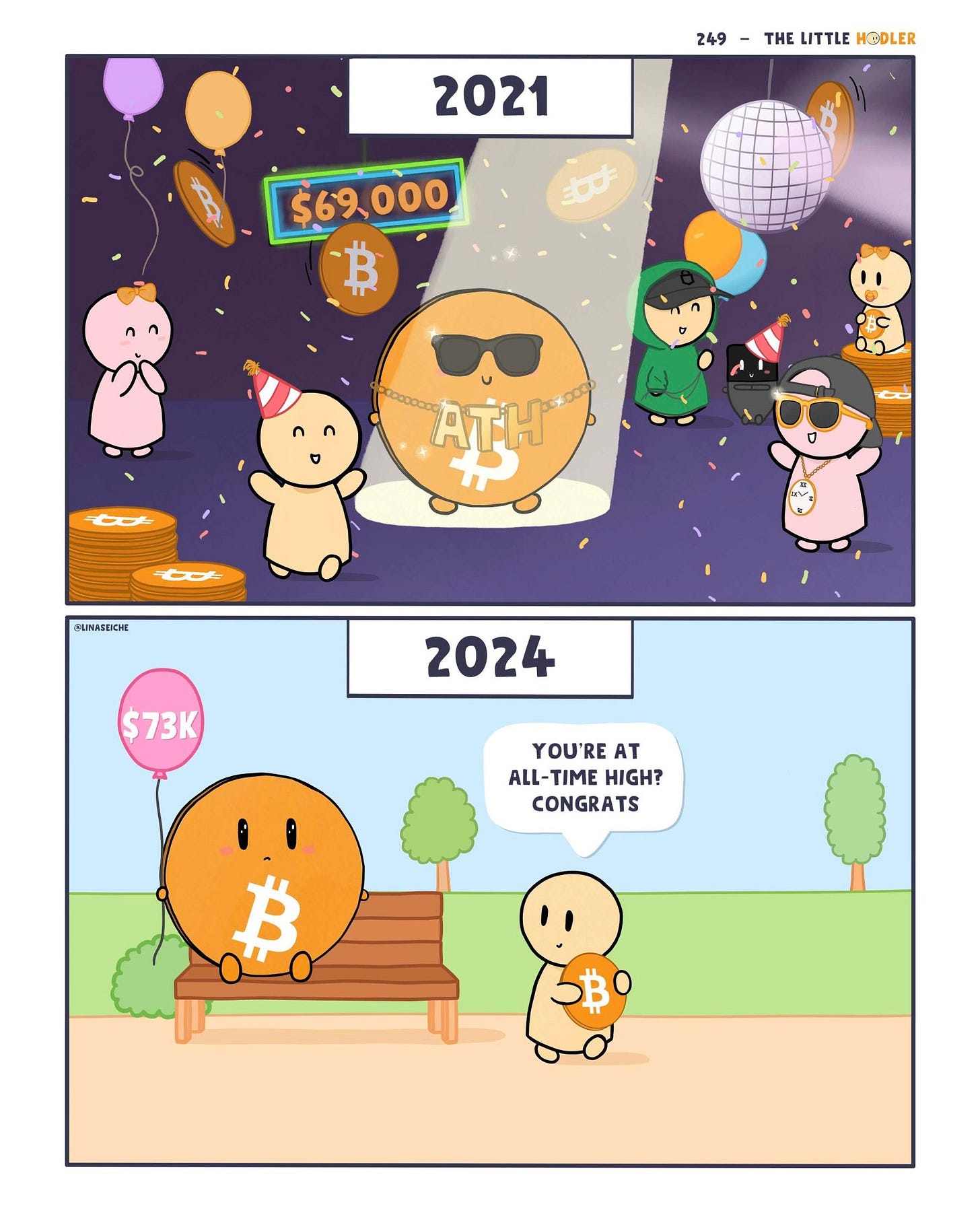Interesting Stuff
Finding Your Place - I don’t really agree with the framing of the article, that there is a place for everyone in the world, because I believe that this is only true of people that are sufficiently mature and moral, but the heart of the article pointed at something that I found insightful. Specifically, that finding the right place (career, relationship, community, etc) for yourself is hard work and doesn’t just fall into your lap. The problem is that fiat jobs are relatively easy to fall into and though they don’t utilize your skills or talents for good, they do have a steady paycheck. That’s the dynamic that’s unfortunately wasted so many talented people in this monetary system.
Blue Zone Lies - We all would like the secret to living longer. Blue Zones are supposedly places where we find people that have done just that and there have been lots of articles and books written about the habits of such people. This article shows just how these are statistical artifacts, or more accurately, lies because of bad economic incentives. Okinawa and Japan, for example, have a pension fraud problem where a bunch of dead people are receiving checks, which obviously inflates their centenarian numbers. In other words, the advice we’ve been told about Blue Zones is more wishful thinking than accurate data.
Volunteering and Community - The article gives voice to the intuitive idea that communities with lots of volunteers are healthy. This is obvious to me when I visit a church, for example, as a church might have lots of volunteers and be unhealthy, but I’ve never seen a church that has few volunteers be healthy. What this article reminded me of is that there are a huge number of volunteers in Bitcoin, both in the open source projects online and in face to face meetups all over the world. Economically, volunteering is not easy to explain, but we all know that it adds a lot of value for any community. This is in stark contrast to altcoin communities, which usually have to pay people to do the same things.
Purple Pilling - There’s a tendency of most people to not want to seem too extreme. They might have one opinion that sounds conspiratorial (red pilled), but as to not appear completely crazy, they hold mostly conventional views on other issues (blue pilled). This article calls such people “purple pilled” and calls them out on this strategy of “not discrediting our cause.” As the author points out, it’s almost always the wrong strategy and one that’s based on fear and status games. I’ve seen this a lot in the Bitcoin community, as the monetary red pill we take does make us look crazy to the no-coiners. Some keep getting red pilled on a lot of other issues, but just as many purple pill to sound more balanced. Yet truth cares not about your status amongst your peer group.
What I'm up to
Virtue and Vice - I talked with Aleks Svetski about his new book and challenged him on some of the points he made in it. We talked about Nietzche, power, Christian morality, Bushido and morality, among many other topics. Virtue is not a topic that’s given enough attention and finding the right basis for it was a worthy thing to discuss. We talked a bit at the end about vice, which I felt needed more addressing. Anyway, I appreciated Aleks coming on and discussing morals and God.
Thank God for Nostr - I did this podcast a few weeks ago to talk about what the opportunities around Nostr are. Mostly, I was saying that right now, it’s a decentralized Twitter, but it has the potential to be so much more because there isn’t that ad incentive. If you want ideas for different types of clients, I present several on this show that you can consider.
Road to Freedom - I’ll be speaking at this event in Santa Barbara later this week. It’ll be fun speaking to conservative college students about why they should be thinking hard about Bitcoin and sound money. My talk is going to be called “Understanding Money” and I should be on around mid day Saturday.
Nostr Note of the Week
What I’m Promoting
Unchained Capital is a sponsor of this newsletter. I am an advisor and proud to be a part of a company that’s enhancing security for Bitcoin holders. If you need multisig, collaborative custody or bitcoin native financial services, learn more here.
Bitcoin
NOIST - NOIST stands for NOn-Interactive Single-round Threshold signatures. The details are somewhat explained in this video, and if there’s no flaw found in it, this would be a massive upgrade over other threshold signature schemes like FROST, ROAST and even ARCTIC. The main idea seems to be a way to distribute shares in such a way that the payload is both encrypted to the intended recipient and verifiable by other participants. They also support resizing (changing t and/or n in the t-of-n scheme) without changing the public key, which is also characteristic of FROST. This seems more implementable than something like FROST which has the multiple interactive round restriction.
BitVMX Optimizations - The blog post is about how this particular flavor of Bitcoin Script Virtual Machine development. In particular, how to debug the various states by creating some tools to do what developers expect from IDEs like breakpoints and seeing the current state of the VM. Because Script is a stack based language, keeping track of the two stacks (main and alternate) turns out to be very useful. If anything, it’s an interesting and deep dive into VM development.
Bitcoind Fee Estimator Analysis - How good is the fee estimator in bitcoind? According to this post, it’s effective, but has a big tendency to overpay. It’s an interesting result in that the priority of the estimator in bitcoind is to get in by a certain number of blocks, and not to save money. Other wallets use different fee estimators which also tend to overpay a bit on fees. It does raise the question, how come there aren’t more fee estimators that underpay occassionally to get in cheaper?
Lightning
10101 Shutting Down - The Lightning/DLC wallet company posts its analysis of the market and why they’re shutting down. They nailed the main reason, which is that the market doesn’t value self-custody nearly as much as the hard core people do. But then again, if you’re placing bets, the bigger concern is liquidity. This isn’t the first company to cry uncle, and it won’t be the last. A lot of these companies are just too early.
Kraken Lightning Germany Saga - Bitcoin Twitter was in an uproar because Kraken stopped Lightning withdrawals in Germany saying that there were some new regulations that forced it. But then Lola did some investigating and couldn’t find any regulation that applied from the government entity that knows about these things. So Kraken afterwards corrected their statement and said that the reason German customers couldn’t withdraw via Lightning was because of something technical. It’s hard to imagine a regulation that would ban lightning withdrawals but not on-chain ones, so it’s a bit of a strange tale, to say the least.
BoltzExchange BOLT12 Decoder - Useful little tool to decode BOLT12 offers if you are implementing this for a Lightning wallet, though I suppose this could also be useful if you’re trying to debug something that happens in your wallet as well. BOLT12 offers can be used for a lot of different uses and I suspect that tools like this will help spawn new uses for the protocol.
Economics, Engineering, Etc.
Microstrategy Gets more BTC - As usual for end-of-quarter financials, Microstrategy has once again acquired a significant amount of Bitcoin (18,300). What’s notable about this round of BTC acquisition is the new metric that they’ve put on their 8K, that of BTC Yield. This is not getting yield on their Bitcoin, but rather, the ratio of Bitcoin to the number of shares. As they report, that’s up 4.4% this quarter and 17% this year. That’s an interesting metric as it gives some context to how MSTR is doing vs BTC.
Bitcoin Workstation - This is a guide for setting up a workstation for only your Bitcoin transactions. This is not meant to be some sort of cold wallet laptop, but for more commercial purposes where there need to be more transactions, perhaps a few per day or more. It still has a hardware wallet that holds the private key in the Blockstream Jade, but has all the functionality of an encrypted computer. I can imagine this type of device becoming more common as we get more Bitcoin-based businesses, as isolating your Bitcoin software in a separate box (your bank!) is a good way to reduce your attack surface.
Zman’s Law of Ossification - Zman posts on delving about his theory on whether a consensus change (presumably a soft fork) can make it into the software. He posits that because new people come in every 4 years due to the price rise, the moving target of new members of a consensus system mean that your window to convince everyone is at most one cycle, or 4 years. It’s an interesting theory, and I think there’s definitely some merit to the logic as we’ve seen with soft fork proposals like Drivechains. It really would be something if there were a soft fork that took longer than 4 years to convince people to implement.
Quick Hits
Real Bitcoin Merchant - The Zaprite blog features a business that accepts bitcoin and what they do/why they do it.
selfie-records.com - You can look up DNS TXT records that relate to Nostr and Bitcoin.
10 Bitcoin Commandments - Moral rules for being a good Bitcoin citizen.
Mining is a hard business - Marty shows how expensive Bitcoin mining is at the moment.
6.6 BTC claimed in puzzle - There’s a transaction from 2015 which gives Bitcoin to random addresses with n bits of entropy where n goes from 1 to 256. Many of these have been claimed, and the most recent one is the 6.6 BTC in the 66 bit address. The 67 bit address has 6.7 BTC in it and hasn’t been claimed yet.
Fiat delenda est.








